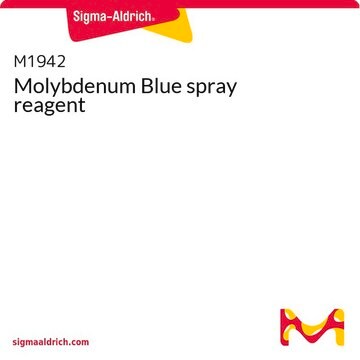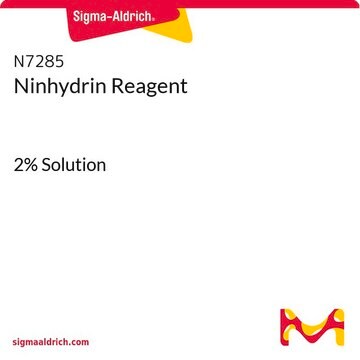Recommended Products
grade
for TLC derivatization
Quality Level
composition
acetic acid
ethyl acetate
sodium iodide
sodium tetraiodobismutate
technique(s)
thin layer chromatography (TLC): suitable
InChI
1S/Bi.4HI.K/h;4*1H;/q+3;;;;;+1/p-4
InChI key
ONBIUAZBGHXJDM-UHFFFAOYSA-J
Application
- Nematocidal alkaloids from the roots of Stemona mairei: This study explores the use of Dragendorff reagent for the identification of nematocidal alkaloids, demonstrating its critical role in the pharmacological profiling and characterization of natural products (Shi et al., 2023).
- Rapid Detection and Determination of Scopolamine in Black Henbane: Leveraging Dragendorff reagent, this research developed a novel nanosensor for detecting scopolamine, an important application in pharmaceutical analysis and toxicology (Mousavizadeh et al., 2022).
- Proximate analysis and multi spectrometric analysis of Strychnos nux-vomica nuts: The use of Dragendorff reagent in the multi-spectrometric analysis highlights its versatility in chemical synthesis and compound identification, providing essential insights for medicinal chemistry (Ramachandran et al., 2022).
- TLC-MS identification of alkaloids in Leonuri Herba and Leonuri Fructus: This study used Dragendorff reagent to optimize a universal derivatization method, enhancing the detection and analysis of key pharmaceutical compounds in traditional medicine (Zhang et al., 2021).
- Densitometric TLC analysis for control of tropane and steroidal alkaloids in Lycium barbarum: Demonstrates the application of Dragendorff reagent in food chemistry for ensuring the safety and efficacy of herbal supplements through the precise detection of alkaloids (Kokotkiewicz et al., 2017).
Other Notes
This non-aqueous Thiess, Reuther and Vagujfalvi variant of the reagent is used to detect alkaloids and other nitrogen compounds in TLC
Signal Word
Danger
Hazard Statements
Precautionary Statements
Hazard Classifications
Eye Dam. 1 - Flam. Liq. 2 - Skin Corr. 1B - STOT SE 3
Target Organs
Central nervous system
Storage Class Code
3 - Flammable liquids
WGK
WGK 3
Flash Point(F)
44.6 °F
Flash Point(C)
7 °C
Personal Protective Equipment
dust mask type N95 (US), Eyeshields, Gloves
Choose from one of the most recent versions:
Already Own This Product?
Find documentation for the products that you have recently purchased in the Document Library.
Customers Also Viewed
Feng Qiu et al.
Drug metabolism and disposition: the biological fate of chemicals, 36(11), 2159-2165 (2008-08-16)
The urinary metabolites of berberine, an isoquinoline alkaloid isolated from several Chinese herbal medicines, were investigated in rats and humans. Using macroporous adsorption resin chromatography, open octadecyl silane column chromatography and preparative high-performance liquid chromatography, we isolated seven metabolites (HM1-HM7)
E. Talas et al.
J. Planar Chromatogr., 5, 28-28 (1992)
Effect of Annona muricata, Abutilon indicum and Evolvulus alsinoides extract on spore germination of sorghum grain mold fungi.
Basha, S. Ameer, A. Sajeli Begum, and G. Raghavendra
International Journal of Bio-resource and Stress Management, 5.1, 102-106 (2014)
W. Funk et al.
J. Planar Chromatogr., 4, 123-123 (1991)
A. Baerheim Svendsen
J. Planar Chromatogr., 2, 8-8 (1989)
Our team of scientists has experience in all areas of research including Life Science, Material Science, Chemical Synthesis, Chromatography, Analytical and many others.
Contact Technical Service













